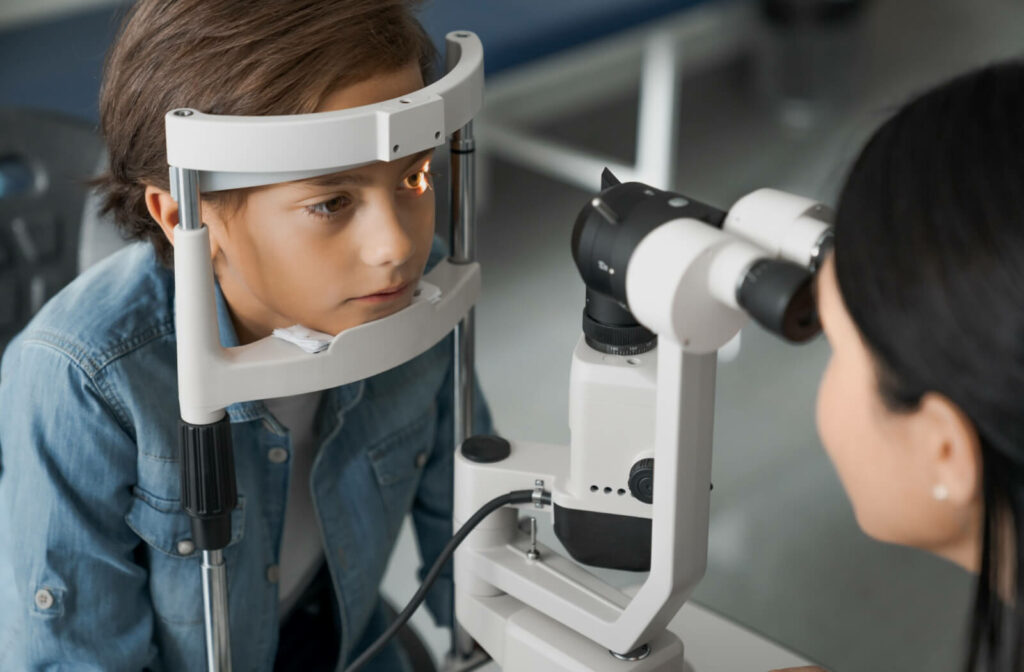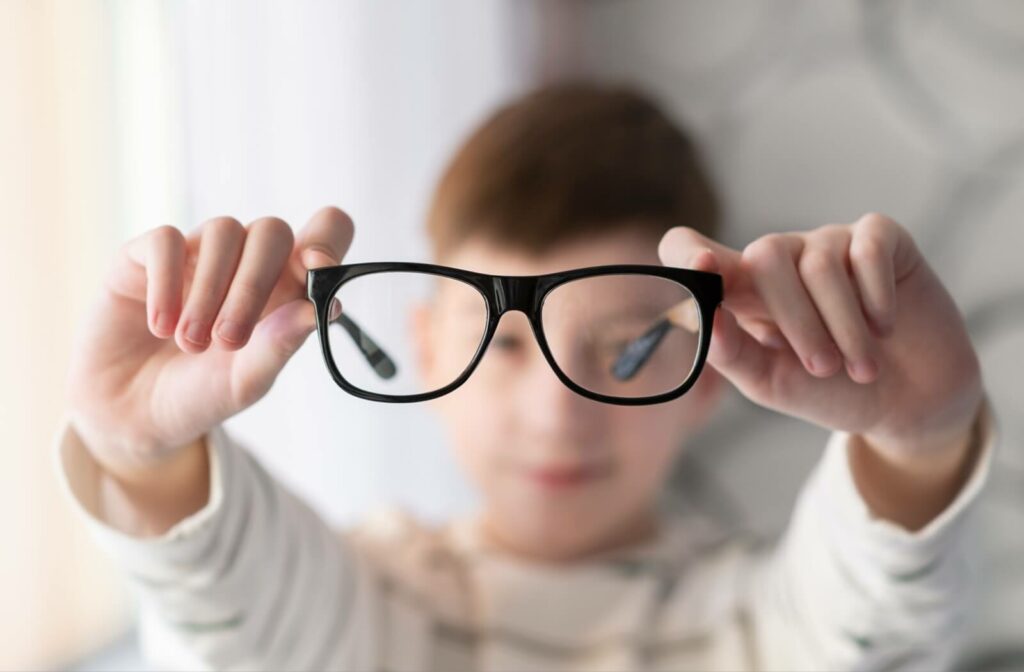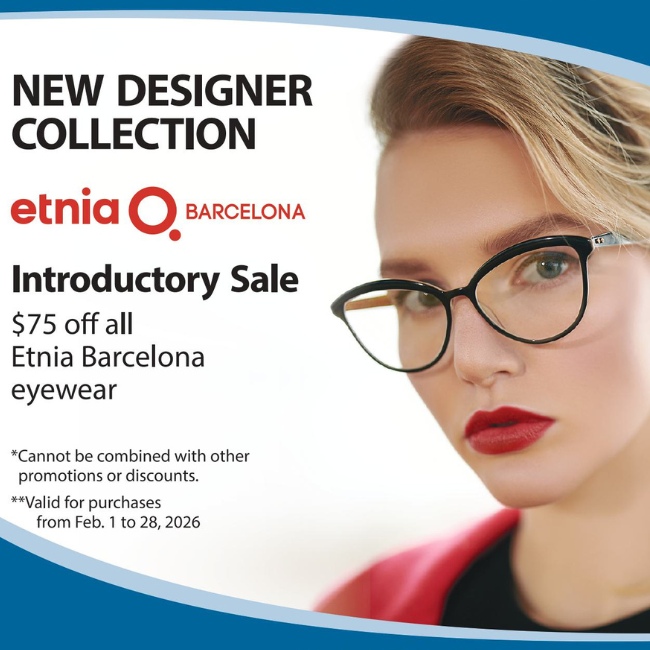Myopia, or nearsightedness, is a common vision problem that makes it harder to see things in the distance. It’s a growing concern, especially for kids and teens.
Traditional glasses correct blurry distance vision, while myopia control treatments like ortho-k lenses and peripheral defocus eyeglasses can help slow its progression.
Spotting myopia early and choosing the right treatment can make a lasting difference in protecting long-term eye health. Myopia eyeglasses and other myopia management methods, plus monitoring with regular eye exams, can help your child maintain clear, comfortable vision.
What Is Myopia?
Myopia is a refractive error that occurs when an elongated eye shape causes light to focus in front of the retina instead of directly on it. People with nearsightedness experience blurry distance vision, while near vision is relatively clear.
The condition typically develops in childhood, often worsening through adolescence until the eye’s growth stabilizes in adulthood.
Myopia is common, and rates are rising globally, especially among children. Managing its progression can help protect your child’s long-term vision health.
Signs of Myopia
Identifying myopia early can make a huge difference, especially for children whose eyes are still developing. If you or your child shows any of the following signs, it might be time for an eye exam:
- Squinting to improve focus while looking at distant objects
- Holding books or electronic devices too close to the face
- Sitting excessively close to screens like TVs or tablets
- Complaining of persistent headaches or eye strain
- Struggling to see the board at school or details in the distance
Myopia can progress quickly, so even mild symptoms can be crucial to identifying when your child needs support.
When left unaddressed, myopia can increase the risk of sight-threatening complications like retinal detachment, glaucoma, or degenerative eye diseases in the future. Early diagnosis and consistent intervention are key to keeping vision healthy and stable.
How Myopia Eyeglasses Work
One of the most common and effective solutions for managing myopia is wearing eyeglasses designed specifically for nearsightedness correction. These lenses alter how light enters the eye, helping it focus correctly on the retina to enhance clear vision.
While standard glasses manage the symptoms of myopia, they don’t stop the condition from worsening. That’s where myopia control treatments come into play. Pairing glasses with proactive control strategies can offer a comprehensive approach to vision care.
Key Benefits of Myopia Eyeglasses
Myopia eyeglasses offer the same benefits as standard eyeglasses but with a prescription tailored to help slow myopia progression. Key benefits include:
- Immediate vision correction to help instantly improve clarity for distance vision
- Comfort & customization with frames & lens designs tailored to your style
- Accessibility with myopia glasses being widely available & noninvasive
Treatment Options for Myopia Control

Beyond traditional eyeglasses, several innovative solutions are available to slow myopia progression effectively. These treatments go beyond simply correcting vision; they help preserve long-term eye health and minimize future risks.
Atropine Eye Drops
Low-dose atropine drops are commonly used to prevent worsening myopia in kids. These specialized drops relax the muscles inside the eye, reducing focusing stress and slowing eye elongation (a key factor in myopia progression).
Atropine is highly effective, with similar results to leading myopia eyeglass or ortho-k options. However, atropine eye drops don’t correct blurry vision, so your child may need to wear standard glasses, myopia eyeglasses, or contact lenses.
Peripheral Defocus Lenses
Bifocal glasses and peripheral defocus lenses are specialized eyeglasses designed for myopia control. They feature different prescriptions within the same lens, which alter how light reaches the retina, signalling the eye to slow its growth.
Myopia control lenses can help reduce myopia progression by up to 50% in some cases.
Orthokeratology (Ortho-K) Lenses
Orthokeratology (ortho-k) is an overnight contact lens option. These gas-permeable lenses gently reshape the cornea while you sleep. After removing the lenses in the morning, the reshaped cornea provides clear vision throughout the day without needing glasses or contact lenses.
While ortho-k helps slow myopia progression in kids, adults with stable vision can also benefit by eliminating the need for daytime corrective lenses.
Why Consider Ortho-K for Myopia Control?
Ortho-k can offer:
- Flexibility for active lifestyles
- For kids & adults who enjoy sports or outdoor activities, eliminating the risk of losing glasses or daily contact lenses
- Noninvasive vision correction
- You can experience clearer daytime vision without glasses or contacts, without surgery or invasive procedures
- Effective results
- Ortho-k is proven to help correct vision & slow myopia progression
Ortho-k is one of the most effective and innovative options for myopia management, offering a dual benefit of convenience and long-term vision health.
Why Early Myopia Management Matters
Addressing myopia early is beneficial for reducing the risks of worsening vision and preventing related complications.
When left unmanaged, severe myopia can lead to a higher risk of retinal detachment, glaucoma, macular degeneration, and cataracts. These conditions can affect independence, daily comfort, and overall eye health.
Proactive management with options like myopia eyeglasses, peripheral defocus lenses, or ortho-k can make a lasting impact on your or your child’s visual future.
Take Control of Myopia Today
Myopia doesn’t have to hold you or your child back. Whether you choose traditional myopia eyeglasses or progressive solutions like ortho-k, taking action today can protect your vision tomorrow.
Visit Maple Ridge Eye Care to schedule a comprehensive eye exam and explore your options for managing myopia. Together, we can find the best solution for your unique needs.


